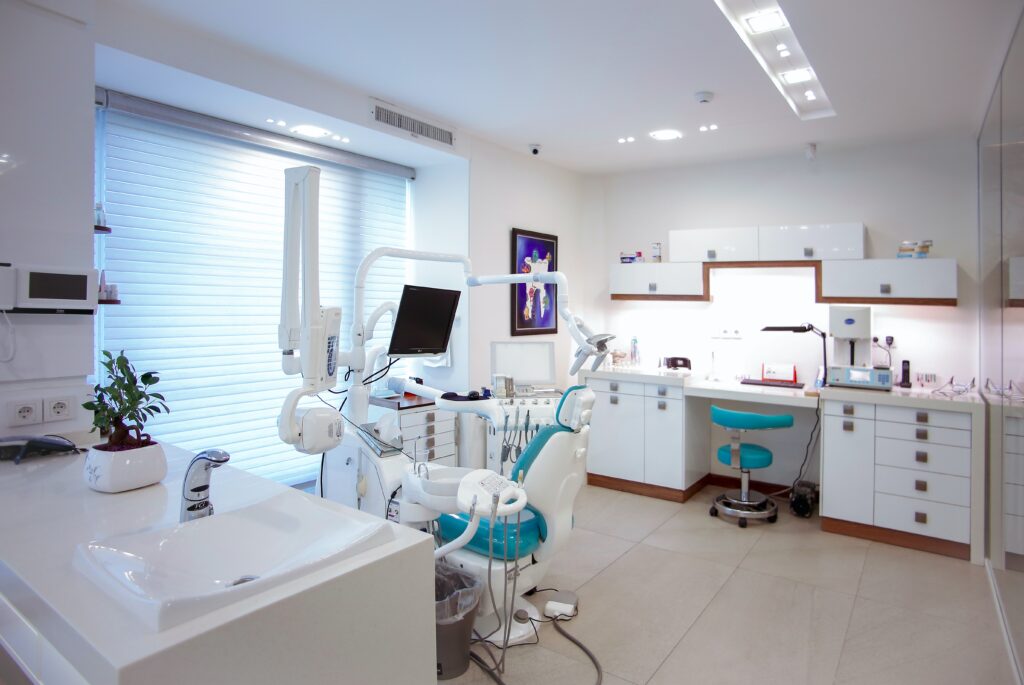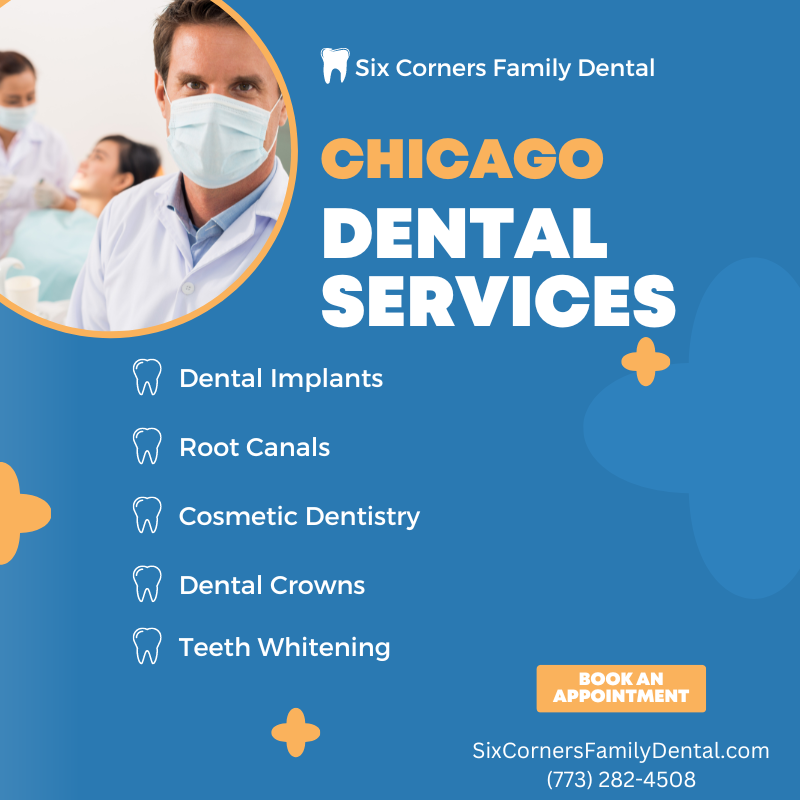Chicago Dental Implant FAQs – Six Corners Family Dental
Are you looking for a long-term dental solution to improve your smile and overall oral health? Dental implants may be the answer you’re looking for. These durable, natural-looking tooth replacements can help restore your confidence and enhance your ability to speak, chew, and smile with ease.
If you’re considering dental implants, it’s important to have all the information you need to make an informed decision. In this article, we’ll explore the basics of dental implants, including what they are, how they work, and what to expect during and after the procedure.
Key Takeaways
- Dental implants are a long-term dental solution for improving your oral health
- Dental implants are durable, natural-looking tooth replacements
- It’s important to have all the information you need to make an informed decision
Larry A. Fisher: One of Chicago’s Best Dentists
If you’re looking for a dental implant specialist in Chicago, Larry A. Fisher is one of the best in the business. With years of experience and specialized training in dental implants, Dr. Fisher has helped countless patients restore their smiles and improve their oral health.
Dr. Fisher earned his Doctorate of Dental Surgery from the University of Illinois at Chicago and completed his residency at Loyola University’s School of Dentistry. He is a member of several professional organizations, including the American Dental Association and the Illinois State Dental Society.
When it comes to dental implants, Dr. Fisher takes a personalized approach to each patient’s needs. He offers a range of implant options to fit individual budgets and oral health conditions, and he uses the latest techniques and technologies to ensure optimal results.

Six Corners Family Dental Care: Your Trusted Dental Clinic
When it comes to dental implants, finding a trusted dental clinic is essential. That’s where Six Corners Family Dental Care comes in.
Located in the heart of Chicago, our clinic offers a wide range of dental services, including dental implants, to adults and children in the community. Our team of experienced and compassionate dentists and staff are dedicated to providing the highest quality care to our patients.
At Six Corners Family Dental Care, we understand that dental issues can be stressful and overwhelming. That’s why we take a patient-centered approach to our services. We listen to your concerns and work with you to develop a treatment plan that fits your unique needs and goals.
In addition to dental implants, we offer a variety of other services, including regular check-ups, cleanings, fillings, and more. We also offer flexible payment options and accept most insurance plans to make dental care accessible to all.
At Six Corners Family Dental Care, your oral health is our top priority. Let us help you achieve a healthy and beautiful smile with our expert dental services. Contact us today to schedule your appointment.
Understanding the Dental Implant Procedure
Getting a dental implant involves a series of steps, starting with a consultation with your dentist. During this initial meeting, you will discuss your oral health history and your goals for dental implants. Your dentist will also examine your mouth to determine whether you have enough bone to support the implant.
If you are a suitable candidate, your dentist will take X-rays and impressions of your teeth, as well as measure the space available for the implant. This information will be used to create a custom-designed implant that fits perfectly in your mouth and matches the color of your natural teeth.
| Step | Description |
|---|---|
| Surgery | During the surgery, your dentist will make an incision in your gums to expose the bone. A small hole will be drilled into the bone, and the implant will be inserted into the hole. The incision will then be closed with stitches. |
| Healing | After surgery, it will take several months for the implant to fully integrate with the bone. During this time, you will need to take care of your oral health by brushing and flossing your teeth regularly and following your dentist’s instructions for post-operative care. |
| Abutment Placement | Once the implant has fully healed, your dentist will attach an abutment to it. This is a small connector piece that will hold the crown or bridge in place. |
| Crown or Bridge Placement | Finally, your dentist will place the crown or bridge on top of the abutment, completing the dental implant process. The result will be a natural-looking, permanent tooth replacement that feels and functions like a real tooth. |
The dental implant procedure is a safe and effective way to restore your smile and improve your oral health. By following your dentist’s instructions and taking good care of your teeth and gums, you can enjoy the benefits of dental implants for many years to come.
Exploring the Costs of Dental Implants
Before getting dental implants, it’s important to consider the costs involved. The total cost of the procedure will depend on several factors.
| Factors affecting the cost of dental implants | Approximate cost range |
|---|---|
| Number of implants needed | $1,000 – $6,000 per implant |
| Additional procedures (such as bone grafting or sinus lifts) | $500 – $3,000 per procedure |
| Insurance coverage | Varies depending on plan and provider |
While dental implants may seem more expensive than other tooth replacement options, such as dentures or bridges, keep in mind the long-term benefits they provide. With proper care, dental implants can last a lifetime, making them a valuable investment in your oral health.
“Dental implant costs can be a significant investment, but they are a life-changing solution that can improve your confidence, speech, and overall quality of life.”
Benefits of Dental Implants: A Life-Changing Solution
Investing in dental implants can be a life-changing decision. Not only do they improve your appearance, but they can also enhance your speech and chewing abilities. Dental implants are a long-term solution that can positively impact your overall health and self-confidence.
Compared to other tooth replacement options, such as dentures or bridges, dental implants are more durable and feel like natural teeth. Unlike dentures which can slip or fall out, dental implants are securely fixed in your jawbone for a comfortable and stable fit. They blend seamlessly with your existing teeth, giving you a natural and beautiful smile.
Aside from their aesthetic benefits, dental implants also improve oral health. They stimulate bone growth, preserving the integrity of your jawbone and preventing bone loss. Additionally, they do not require the reduction of neighboring teeth, unlike bridges, which helps maintain the overall health of your teeth and gums.
Dental implants are a long-term investment in your health and well-being. While the initial cost may be higher than other options, they are a worthwhile investment due to their durability and long-term benefits. Additionally, many insurance plans now offer coverage for dental implants, making them a more accessible option for patients.
Are Dental Implants Right for You?
The suitability of dental implants depends on individual needs and oral health conditions. Consulting with a qualified dental professional, such as Larry A. Fisher at Six Corners Family Dental Care, can help determine if dental implants are the right choice for you.
- If you have missing teeth or significant tooth damage, dental implants may be a good option for you.
- If you have healthy gums and enough jawbone to support the implants, dental implants may be a viable choice.
- However, if you have certain medical conditions, such as uncontrolled diabetes or a weakened immune system, dental implants may not be recommended.
Ultimately, dental implants offer a life-changing solution for those seeking a long-term, durable, and natural-looking tooth replacement option. Consult with a dental implant specialist to determine if they are the right choice for you.

Addressing Dental Implant Complications
Getting dental implants is generally a safe and effective procedure, but with any surgery, there are potential risks and complications to be aware of. Here are some of the possible complications associated with dental implants:
| Complication | Description |
|---|---|
| Infection | Around 1-6% of implant surgeries may result in an infection. Symptoms may include swelling, pain, and discharge. Antibiotics and drainage may be necessary. |
| Nerve damage | In rare cases, nearby nerves may be damaged during implant placement, leading to numbness, tingling, or pain in the lower lip, chin, or tongue. Most cases are temporary, but some may be permanent. |
| Implant failure | Occasionally, implants may not integrate properly with the jawbone, leading to implant failure. This may occur immediately or months after implant placement. Factors such as smoking, poor oral hygiene, and certain medical conditions may increase the risk of implant failure. |
It’s important to discuss the risks and possible complications with your dental implant specialist before undergoing the procedure. Your dentist will be able to evaluate your individual case and determine if dental implants are a suitable option for you.
To reduce the risk of complications, it’s essential to maintain proper oral hygiene before and after the surgery. Follow your dentist’s instructions for post-operative care, including taking any prescribed medications and attending follow-up appointments. With proper care and attention, you can minimize the risk of complications and enjoy the benefits of a healthy and confident smile.
Dental Implant Surgery: What to Expect
If you are considering dental implants, it is normal to feel a little apprehensive about the surgical procedure. However, you can rest assured that the process is safe and generally well-tolerated by patients. The following information will help you understand what to expect during the dental implant surgery.
Prior to the surgery, your dentist will discuss your medical history and any medications you are taking. You may also be asked to fast for a few hours before the procedure, depending on the type of anesthesia you will receive.
During the surgery, the dentist will make a small incision in your gum to access the bone and create a space for the implant. This may involve drilling a small hole and inserting the implant screw, or creating a small channel for a custom-made implant. The procedure typically takes one to two hours per implant.
Your dentist will use local anesthesia or sedation to keep you comfortable during the procedure. You may feel some pressure or vibration, but should not experience any pain. If you are nervous or anxious, your dentist can also prescribe a medication to help you relax.
After the surgery, you may experience some bleeding and swelling. Your dentist will provide specific instructions for post-operative care, which may include using ice packs, taking pain medication, and avoiding certain foods and activities. It is important to follow these instructions carefully to ensure a successful healing process.
Most patients are able to return to work and resume normal activities within a few days of the surgery. However, it may take several months for the implant to fully integrate with the bone and for the final restoration to be placed.
If you have any concerns or questions about the dental implant surgery, be sure to discuss them with your dentist. With proper preparation and care, you can look forward to a healthy smile with dental implants.
Exploring Dental Implant Options
If you’re considering dental implants, there are different options available depending on your specific needs and oral health condition. Below are some of the most common dental implant options:
| Type of Implant | Description |
|---|---|
| Single-Tooth Implants | These implants are used when a single tooth is missing and require a titanium post to be placed in the jawbone. After the post has fused with the bone, a crown is attached. |
| Implant-Supported Bridges | These implants are used when two or more adjacent teeth are missing. The bridges are anchored to the implants rather than the remaining natural teeth, providing a more secure and durable solution. |
| Full-Arch Implants | Also known as All-on-4 or All-on-6 implants, these are used when all teeth in the upper or lower arch are missing. Four or six implants are placed in the jawbone and a customized denture or bridge is attached. |
It’s important to consult with your dentist to determine which type of implant is best for you. Factors such as the number of missing teeth, bone density, and overall oral health should be taken into consideration to ensure a successful implant placement and long-lasting results.

Dental Implant Recovery: Tips for a Successful Healing Process
Congratulations on taking the first step towards a healthier, happier smile with dental implants! The recovery process after dental implant surgery is crucial in ensuring the success of the procedure. Here are some tips to help you have a smooth and successful healing process.
Post-Operative Care
Following your surgery, your dentist will provide you with detailed instructions on how to care for the implant site. It is important to follow these instructions carefully to avoid complications. You may be advised to avoid brushing or flossing the implant site for a few days, and to rinse your mouth with an antiseptic mouthwash.
Dietary Restrictions
During the healing process, it is important to avoid hard, crunchy, or sticky foods that can damage the implant site. You may also be advised to stick to a soft or liquid diet for the first few days after surgery. It is important to stay hydrated and avoid alcohol and smoking during the healing process.
Pain Management
It is normal to experience some discomfort and swelling after dental implant surgery. Your dentist may prescribe pain medication or recommend over-the-counter pain relievers to help manage your discomfort. Applying ice to the affected area can also help reduce swelling.
Follow-Up Appointments
It is important to attend all follow-up appointments with your dentist to ensure that your implants are healing properly. Your dentist will monitor your progress and make any necessary adjustments to your treatment plan. It is important to notify your dentist if you experience any complications or have any concerns during the recovery process.
By following these tips for dental implant recovery, you can help ensure a successful and long-lasting outcome. Remember to take care of your oral health and maintain good oral hygiene habits to keep your new smile looking and feeling great!

Implant Dentists Near Me
If you are located in the Chicago area and are looking for a dentist close to you, contact the Chicago dental implant professionals at Six Corners Family Dental.
We can help get you the beautiful smile you have been after and for a fair price. Then you will see why that Larry Fisher is considered the best dentist in Chicago!
Call us at (773) 282-4508 or fill out the online dental contact form.
🪥Other Dental Posts
🦷 Top Chicago Cosmetic Dental Services
🦷 Emergency Dental Care in Chicago
🦷 Dentist Open on Saturday Near Me
🦷 View other Dental Blog Posts & FAQs
Portage Park Chicago Dental Implants
We provide dental implant services in the Chicago area and we are located in the Portage Park community area and 6 corners neighborhood. We are located in the 60641 area code and provide top dental implant services to all Chicago residents.
FILL OUT FORM TO SETUP APPOINTMENT
Chicago Dental Implant Offices
Larry A. Fisher, D.D.S.
4949 W. Irving Park Rd., Suite B
Chicago, IL 60641
(773) 282-4508
Free Parking Available
CHICAGO DENTAL IMPLANTS – Areas Serviced
Zipcode Serviced: 60641, 60068, 60171, 60301, 60302, 60303, 60305, 60607, 60612, 60613, 60614, 60618, 60624, 60625, 60626, 60630, 60631, 60634, 60639, 60640, 60644, 60645, 60646, 60647, 60651, 60656, 60657, 60659, 60660, 60706, 60707, 60712
Cities Serviced: Chicago, Elmwood Park, Harwood Heights, Lincolnwood, Oak Park, River Grove, River Forest, Park Ridge, Elmwood Park, Harwood Heights, Lincolnwood, Oak Park, River Grove, River Forest, Park Ridge
Chicago Communities: Portage Park, Irving Park, Dunning, Montclare, Belmont Cragin, Hermosa
Chicago Neighborhoods: Belmont Central, Władysławowo, Six Corners, Avondale Gardens, Independence Park, Kilbourn Park, Little Cassubia, Old Irving Park, Merchant Park, The Villa, Belmont Heights, Belmont Terrace, Irving Woods, Schorsch Village, Belmont Central, Hanson Park, Belmont Gardens, Kelvyn Park


